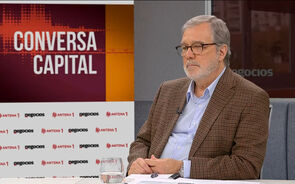Cramer- "Steve Galbraith Hits Nail on Head"
2 mensagens
|Página 1 de 1
Cramer- "Steve Galbraith Hits Nail on Head"
Mais um artigo muito interessante do Cramer. Desta vez ele dá conta dos argumentos "bearishs" de um dos analistas que ele mais aprecia...
Ulisses
"Steve Galbraith Hits Nail on Head"
By James J. Cramer
10/16/2003 02:45 PM EDT
"Sometimes a thought, a piece of research or a speech has remarkable resonance because it's so spot-on. Usually, for a kernel to become top-of-mind, many things have to be in place:
The writer has to be respected;
The writer has to have been visibly right about a particular turn in the market; and
It has to be able to crystallize something that institutional folks may not be aware of because they don't traffic in that world.
Right now, "Institutional Memory Joins Jumbo Shrimp at the Oxymoron Table," an Oct. 6 overview piece by Steve Galbraith, fits that matrix to a T.
When I made my call to take something off the table in March of 2000, a reverse position to what I'd been advocating as recently as three weeks before, I was heavily influenced by Galbraith. I talk to Steve quite a bit -- I always find it valuable, if not flattering, that he gives me the time -- and when he testified in front of Congress that margin debt had gotten totally out of hand in March of 2000, I took it as a sign that I have to rethink my game plan. He'd been grousing about margin debt for a couple of months, but he was shouting fire in a crowded room by that point, and I was close enough to the exits to make it work for me.
In fact, I bought bonds for the first time in my life, personally, off that call, in what turned out to be one of the best calls of my life that really belonged to Mr. Galbraith.
Now, in his "Jumbo Shrimp" piece, which is what everyone is calling it, he describes three worrisome trends that, while not yet destructive, could become destructive if they get out of hand. Or, in his terms, "Financially the good continue to outweigh the bad and stocks still seem to be a better deal than bonds. Our concern is that we are seeing enough signs of a return to bubble-head behavior that the probability of the market overheating is increasing."
Those signs include:
1. Big pickup in margin debt -- the highest in a year's time -- but still well below the nutty peak of 2000.
2. Reckless trading in pink sheets, which now exceeds the New York Stock Exchange in daily volume -- pretty scary.
3. Lots of really bad stocks doing really well.
He does point out that the IPO market is more sane than ever, unlike 2000, but that was remedied by Sarbanes-Oxley, which makes it a nightmare to be public until you are big enough to absorb the high costs of being a public company. In a strange way Sarbox has done what the SEC could never do: create a block to companies coming public that don't deserve to be public, something you could never count the continually irresponsible fee-based brokerage houses to do.
Still, he goes on, "Clearly, a select group of investors (and we use the term loosely) have returned to the concept of trading share certificates rather than company prospects. We have not witnessed such a toxic trading brew on a sustained basis since the first part of 2000."
There's that date again.
It's funny, but I penned my upside blowoff-1,000-point rally-melt-up piece ahead of reading "Jumbo Shrimp." But the empirical evidence Steve provides gives me the intellectual backbone behind the feeling that we could have an unblessed ramp here.
It's unusual that the seeds to the potential destruction of this bull lie in the velocity of the price appreciation and the nature of the cohort of stocks that is going higher. But speculation in any form will be quelled by the Federal Reserve no matter how many times the Fed assures us that it will keep rates low.
If we get a noisome increase in the more visible averages to go along with the rise in Bulletin Board stocks and a sufficient rise in margin debt, we'll be dealing with 100-basis-point fed fund increments. As usual, the Fed, in its stupefying way, won't adjust margin -- it will adjust the big rates that are playing such a bountiful role, for example, in the financials.
If we lose the financials, as you know, I am out of here. I'm not playing with a rally based on the Nasdaq 100. You didn't fool me the first time, and you aren't fooling me this time, either.
Get the piece. Commit it to memory. It will be the topic of some discussion for some time because Galbraith, at the biggest turn of our time, was 1 for 1, which means he's batting 1.000. "
(in www.realmoney.com)
Ulisses
"Steve Galbraith Hits Nail on Head"
By James J. Cramer
10/16/2003 02:45 PM EDT
"Sometimes a thought, a piece of research or a speech has remarkable resonance because it's so spot-on. Usually, for a kernel to become top-of-mind, many things have to be in place:
The writer has to be respected;
The writer has to have been visibly right about a particular turn in the market; and
It has to be able to crystallize something that institutional folks may not be aware of because they don't traffic in that world.
Right now, "Institutional Memory Joins Jumbo Shrimp at the Oxymoron Table," an Oct. 6 overview piece by Steve Galbraith, fits that matrix to a T.
When I made my call to take something off the table in March of 2000, a reverse position to what I'd been advocating as recently as three weeks before, I was heavily influenced by Galbraith. I talk to Steve quite a bit -- I always find it valuable, if not flattering, that he gives me the time -- and when he testified in front of Congress that margin debt had gotten totally out of hand in March of 2000, I took it as a sign that I have to rethink my game plan. He'd been grousing about margin debt for a couple of months, but he was shouting fire in a crowded room by that point, and I was close enough to the exits to make it work for me.
In fact, I bought bonds for the first time in my life, personally, off that call, in what turned out to be one of the best calls of my life that really belonged to Mr. Galbraith.
Now, in his "Jumbo Shrimp" piece, which is what everyone is calling it, he describes three worrisome trends that, while not yet destructive, could become destructive if they get out of hand. Or, in his terms, "Financially the good continue to outweigh the bad and stocks still seem to be a better deal than bonds. Our concern is that we are seeing enough signs of a return to bubble-head behavior that the probability of the market overheating is increasing."
Those signs include:
1. Big pickup in margin debt -- the highest in a year's time -- but still well below the nutty peak of 2000.
2. Reckless trading in pink sheets, which now exceeds the New York Stock Exchange in daily volume -- pretty scary.
3. Lots of really bad stocks doing really well.
He does point out that the IPO market is more sane than ever, unlike 2000, but that was remedied by Sarbanes-Oxley, which makes it a nightmare to be public until you are big enough to absorb the high costs of being a public company. In a strange way Sarbox has done what the SEC could never do: create a block to companies coming public that don't deserve to be public, something you could never count the continually irresponsible fee-based brokerage houses to do.
Still, he goes on, "Clearly, a select group of investors (and we use the term loosely) have returned to the concept of trading share certificates rather than company prospects. We have not witnessed such a toxic trading brew on a sustained basis since the first part of 2000."
There's that date again.
It's funny, but I penned my upside blowoff-1,000-point rally-melt-up piece ahead of reading "Jumbo Shrimp." But the empirical evidence Steve provides gives me the intellectual backbone behind the feeling that we could have an unblessed ramp here.
It's unusual that the seeds to the potential destruction of this bull lie in the velocity of the price appreciation and the nature of the cohort of stocks that is going higher. But speculation in any form will be quelled by the Federal Reserve no matter how many times the Fed assures us that it will keep rates low.
If we get a noisome increase in the more visible averages to go along with the rise in Bulletin Board stocks and a sufficient rise in margin debt, we'll be dealing with 100-basis-point fed fund increments. As usual, the Fed, in its stupefying way, won't adjust margin -- it will adjust the big rates that are playing such a bountiful role, for example, in the financials.
If we lose the financials, as you know, I am out of here. I'm not playing with a rally based on the Nasdaq 100. You didn't fool me the first time, and you aren't fooling me this time, either.
Get the piece. Commit it to memory. It will be the topic of some discussion for some time because Galbraith, at the biggest turn of our time, was 1 for 1, which means he's batting 1.000. "
(in www.realmoney.com)
2 mensagens
|Página 1 de 1
Quem está ligado:
Utilizadores a ver este Fórum: Bing [Bot], Google [Bot], Google Adsense [Bot], Lisboa_Casino, m-m, Phil2014 e 166 visitantes



